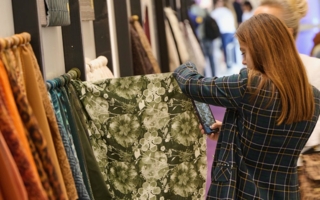05/09/2018 – wet-green GmbH — auf Deutsch lesen
Olive leather from Reutlingen
“Every effort to make the production of leather less harmful to people and the environment is respectable,” say wet-green. “That’s not enough for us!”
It was many years ago that Dr. Heinz-Peter Germann, Stefan Banaszak and Thomas Lamparter put together a team to produce a sustainable, 100% plant-based tanning agent. The aim was to be able to produce a high-quality, refined and versatile leather that was in no way inferior to conventionally produced leather but at the same time was produced in an ecologically sound, economical and socially sustainable manner.
Tanning agent from olive leaves
The patented wet-green OBE tanning agent is derived from the leaves of olive trees growing in the Mediterranean region. The agent is actually edible, although it has a bitter taste. The concentrate, of 100% vegetable origin, is based on an aqueous olive leaf extract containing tanning agents that are also present in extra virgin olive oil and in natural cosmetics. The agent is absolutely harmless to health and has been awarded the ‘Very good’ seal by Dermatest.
The Reutlingen-based company is justifiably proud of its gold Cradle to Cradle certificate. The leaves that are collected as a by-product of the olive harvest are generally burnt. By using them as a raw material for the tanning agent, CO2 emissions are substantially reduced and neither foodstuffs nor agricultural land are used. More than that – sale of the leaves opens up a new source of income for olive growers. The wet-green OBE tanning agent is fully bio-degradable and is free from metals, synthetic chemical reactive tanning agents and other harmful materials. Its use in tanning also eliminates or reduces the use of acids, salts, syntans and dyes. The independent EPEA Institute states that “from a Cradle to Cradle perspective, [the wet-green OBE tanning agent] represents the ideal alternative tanning process.” This is partly due to the fact that compared to other vegetable tanning agents, water consumption is significantly lower when tanning with the olive leaf agent – indeed, it is comparable to that of chrome-tanned leather.
The concentrate also gets top marks in the fields of hazardous characteristics, material health, tanning process, recyclability and social fairness. The agent is not corrosive, nor does it come under the auspices of the Hazardous Goods Regulations, which is especially important where logistics is concerned.
Although the quantities involved are small, olive leathers are already in use in a wide variety of products, including in leather seats for the automotive sector, in the production of sofas and chairs for the furniture industry, by shoe manufacturers and by producers of high-quality leather clothing, bags and accessories.
More and more often, rediscovered fields of master craftsmanship are running up against the desire for luxurious but ethically responsible products. The wet-green company coined for itself the term ‘luxtainability’ to describe the luxury of affording sustainably produced goods.
by Reiner Knochel





